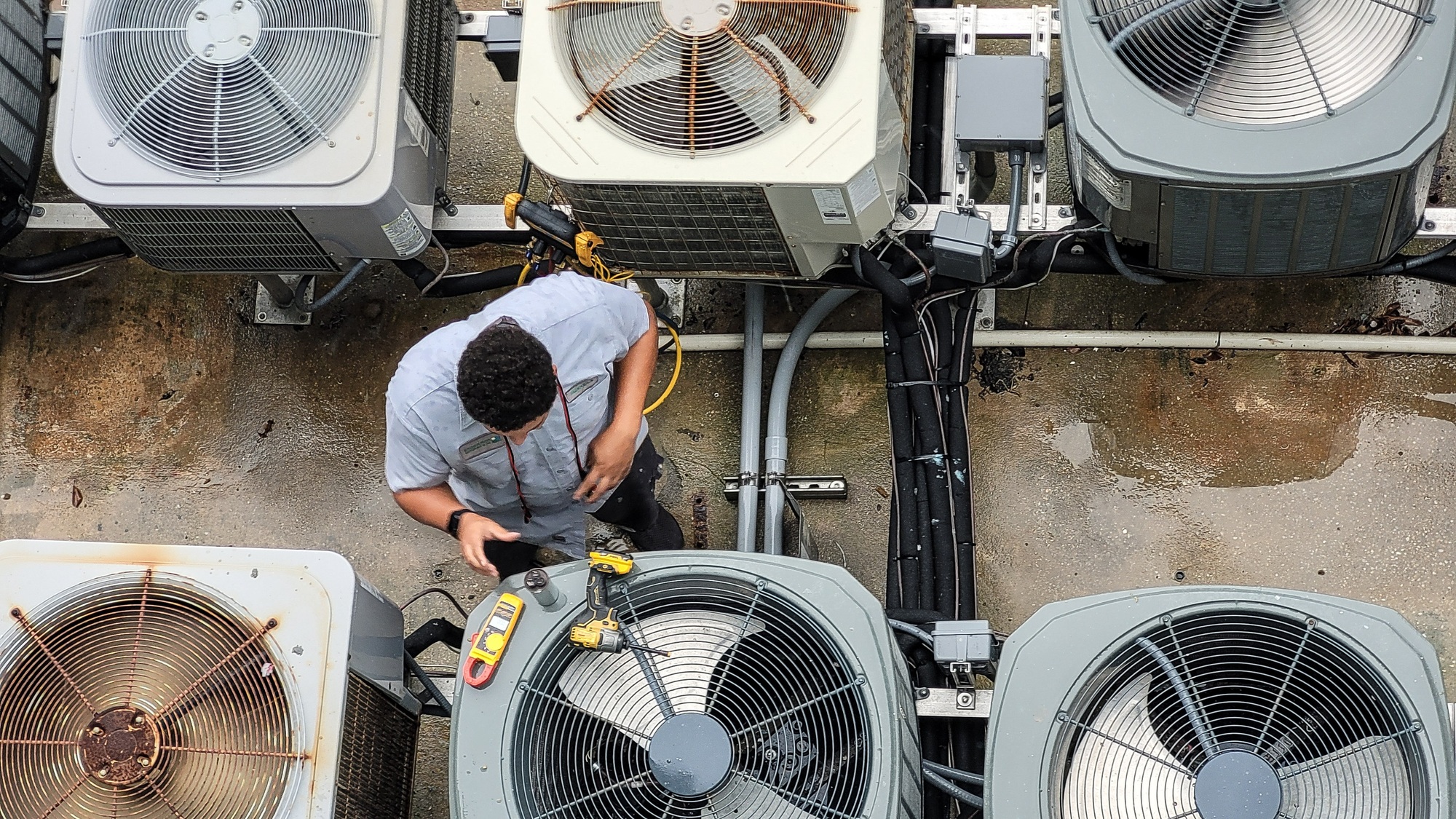Key Takeaways

- Understanding Market Dynamics: The HVAC industry is valued at around $240 billion in the U.S. and is experiencing a steady annual growth rate of approximately 5%, driven by rising demand for energy-efficient systems and climate control.
- Key Business Opportunities: Focus on high-demand areas such as energy-efficient systems, smart technology installations, maintenance services, and indoor air quality solutions to strategically position your business for success.
- Create a Comprehensive Business Plan: A well-structured business plan includes your objectives, target market, operational strategies, financial projections, and marketing strategies, enhancing your chances of securing funding and guiding decisions.
- Necessary Tools and Equipment: Equip your HVAC business with essential tools like manifold gauge sets, refrigerant recovery machines, vacuum pumps, and safety gear to ensure effective service delivery.
- Implement Efficient Inventory Management: Utilize inventory tracking software and organize storage to maintain optimal stock levels and establish strong supplier relationships to enhance service delivery.
- Effective Marketing Strategies: Develop a robust online presence and engage in networking to build brand awareness, attract customers, and establish credibility in the competitive HVAC market.
Starting your own HVAC business can be an exciting venture that opens doors to financial independence and career fulfillment. With the growing demand for heating, ventilation, and air conditioning services, now’s the perfect time to dive into this thriving industry. Whether you’re a seasoned technician or just starting out, understanding the essentials of launching your business is crucial.
From creating a solid business plan to navigating licensing requirements, each step you take lays the foundation for your success. You’ll not only provide valuable services to your community but also build a brand that stands out in a competitive market. Let’s explore the key steps to help you turn your HVAC dreams into reality.
Understanding The HVAC Industry

Understanding the HVAC industry is crucial for your startup’s success. The sector offers various opportunities for growth and profitability, particularly for small business owners venturing into HVAC services.
Market Overview
The HVAC market is valued at approximately $240 billion in the United States. With a steady annual growth rate of around 5%, this market is expanding due to rising construction activities and increasing consumer demand for energy-efficient systems. Additionally, more homeowners and businesses prioritize climate control, creating a consistent need for HVAC services. The market offers diverse segments, including residential, commercial, and industrial services, allowing you to choose areas that align with your expertise or interests.
Key Opportunities
Key opportunities exist in the HVAC industry that can fuel your small business. Consider the following areas:
- Energy Efficiency: Increasing awareness of sustainability drives demand for energy-efficient systems. You can focus on installing high-efficiency units that lower utility costs for clients.
- Smart Technology: Smart HVAC systems provide advanced features like remote monitoring and control. Offering installation and maintenance of these systems can attract tech-savvy customers.
- Maintenance Services: Regular system maintenance is crucial for optimal performance. Providing maintenance contracts can create recurring revenue and customer loyalty.
- Indoor Air Quality: Health concerns elevate the need for air quality solutions. Services like air purification and ventilation optimization can set you apart in the market.
Exploring these opportunities allows you to strategically position your HVAC business for success while meeting the evolving needs of your target customers.
Steps To Start An HVAC Business

Starting an HVAC business requires careful planning and execution. Focus on these key steps to position your startup for success in a growing market.
Developing A Business Plan
Create a comprehensive business plan that outlines your objectives, target market, and operational strategies. This plan should include financial projections, marketing strategies, and competitor analysis. A well-structured business plan enhances your chances of securing funding and guides your business decisions as you launch your HVAC startup. Incorporate services like installation, repair, and maintenance, as these are essential for attracting potential customers.
Registering Your Business
Register your HVAC business with the appropriate state and local agencies to ensure compliance. Choose a suitable business name and structure — be it a sole proprietorship, partnership, or LLC. Proper registration contributes to building credibility with clients and helps you obtain necessary licenses and permits. Completing these legal steps ensures a solid foundation for your small business.
Essential Equipment And Tools
Starting an HVAC business requires specific tools and equipment that ensure efficiency and effectiveness in service delivery. Understanding these essentials is crucial for your startup’s success as you enter the competitive HVAC market.
HVAC Tools You Need
- Manifold Gauge Set: This vital tool measures pressure in HVAC systems. Accurate readings help diagnose issues and ensure proper refrigerant levels.
- Refrigerant Recovery Machine: Use this for safe and compliant refrigerant recovery during repairs or installations, adhering to environmental regulations.
- Vacuum Pump: This device removes air and moisture from the refrigerant lines, which is critical for system performance and longevity.
- Thermometers: Digital thermometers provide precise temperature readings, enabling you to check operation efficiency and diagnose system problems quickly.
- Electrical Test Instruments: Multimeters and clamp meters allow you to diagnose electrical components and system failures effectively.
- Duct Tools: Various duct tools such as duct sealants, sheet metal tools, and duct knives facilitate proper installation and maintenance of ductwork.
- Hand Tools: A range of hand tools like wrenches, screwdrivers, and pliers assist in general installations and repairs.
- Safety Gear: Personal protective equipment, including gloves and safety goggles, ensures safety during your work operations.
Inventory Management
Efficient inventory management ensures that you have necessary tools and parts available for your jobs without over-investing in stock. Utilize these strategies:
- Implement Inventory Tracking: Use software to monitor inventory levels, set reorder points, and track usage patterns. This helps maintain optimal stock levels.
- Organize Storage: Store tools and equipment in designated areas. Clear labeling simplifies access and minimizes time spent searching for items.
- Conduct Regular Audits: Schedule routine checks to assess stock levels, identify slow-moving items, and adjust purchasing decisions accordingly.
- Establish Supplier Relationships: Build strong connections with reliable suppliers. Consistent access to quality parts and equipment enhances your service delivery.
- Utilize Inventory Management Software: Technology simplifies tracking and ordering, allowing you to focus on customer service and business growth.
By addressing essential tools and effective inventory management, you lay a strong foundation for your HVAC small business, equipping yourself to meet customer demands confidently.
Marketing Strategies For Your HVAC Business
Effective marketing strategies are crucial for growing your HVAC business. By implementing targeted approaches, you can build brand awareness and attract customers.
Building An Online Presence
Establishing an online presence is vital for your HVAC startup. Create a professional website showcasing your services, customer testimonials, and contact information. Optimize your website for search engines to enhance visibility. Use local SEO tactics to target customers in your area. Regularly update content through blog posts about HVAC maintenance tips and innovations in energy efficiency. Additionally, utilize social media platforms to engage with your audience, share promotions, and showcase successful projects. Creating informative content enhances your brand’s credibility while helping customers make informed decisions about your services.
Networking and Partnerships
Networking and forming partnerships can expand your reach within the HVAC industry. Attend local trade shows and industry conferences to meet potential clients and partners. Collaborate with complementary businesses, such as construction firms or real estate agencies, to cross-promote services. Building relationships with suppliers can lead to better pricing and exclusive deals on equipment. Participate in community events to establish a local presence and gain customer trust. These networking strategies enhance your visibility and help you connect directly with your target market, ensuring sustained growth for your small business.
Financial Planning And Budgeting
Financial planning and budgeting are crucial steps for a successful HVAC startup. You must focus on estimating initial investments and managing operational costs effectively.
Initial Investment Estimation
Estimate the initial investment required to set up your HVAC business. Common expenditures include:
- Equipment Costs: Allocate funds for purchasing essential tools and machinery. Equipment like manifold gauge sets, refrigerant recovery machines, and vacuum pumps can total around $10,000 to $30,000.
- Licensing and Permits: Registration fees for licenses vary by location, ranging from $100 to $2,000.
- Insurance: Factor in the cost of liability insurance, which typically ranges from $500 to $2,000 annually.
- Marketing Expenses: Set aside a budget for your marketing efforts, usually between $500 and $5,000 for branding and online presence.
Create a detailed budget that outlines these expenses to ensure adequate funding when starting a small business.
Managing Operational Costs
Managing operational costs effectively keeps your HVAC startup financially healthy. Key areas to consider include:
- Labor Costs: Pay competitive wages while keeping employee costs manageable. This typically constitutes a major portion of your monthly expenses.
- Material Costs: Monitor the prices of HVAC supplies consistently. Keep relationships with suppliers to secure better pricing.
- Utility Costs: Calculate your utility expenses accurately, particularly if you operate from a physical location. Implement energy-efficient practices to reduce overhead.
- Marketing Expenses: Keep marketing costs controlled while maximizing reach through online platforms and community engagement.
Regularly reviewing these costs ensures you maintain financial stability as you grow your HVAC business.
Conclusion
Starting your own HVAC business can be a rewarding endeavor filled with potential. By focusing on the essential steps like creating a solid business plan and understanding the necessary tools and equipment, you can set yourself up for success.
Emphasizing effective marketing strategies and networking will help you establish a strong presence in the industry. As you navigate financial planning and budgeting, staying organized and proactive will ensure you maintain stability and growth.
With the right approach and dedication, you can build a thriving HVAC business that meets the needs of your customers while contributing to the growing demand in the market. Your journey in the HVAC industry is just beginning, and the possibilities are endless.
Frequently Asked Questions
What is the demand for HVAC businesses?
The demand for HVAC services is growing, driven by increasing construction activities and consumer interest in energy-efficient systems. The market value of the HVAC industry in the U.S. is approximately $240 billion, with an annual growth rate of around 5%.
What are the key steps to start an HVAC business?
To start an HVAC business, create a solid business plan, register your business, choose a suitable name and structure, and ensure compliance with local and state licensing requirements.
What equipment do I need for my HVAC business?
Essential equipment for an HVAC business includes manifold gauge sets, refrigerant recovery machines, vacuum pumps, thermometers, electrical test instruments, duct tools, hand tools, and safety gear to perform services effectively.
How important is marketing for an HVAC business?
Effective marketing is crucial for growing an HVAC business. Establishing an online presence, optimizing your website for search engines, and engaging with customers on social media can enhance visibility and attract clients.
What are the initial costs for starting an HVAC business?
Initial costs for starting an HVAC business typically range from $10,000 to $30,000, covering equipment, licensing, permits, insurance, and marketing expenses. Creating a detailed budget is recommended to plan funding effectively.
How can I manage inventory for my HVAC business?
Effective inventory management can involve tracking inventory, organizing storage, conducting regular audits, building supplier relationships, and using inventory management software to meet customer demands efficiently.
Image Via Envato: acinar13, osbmxhouse, Beachbumledford



